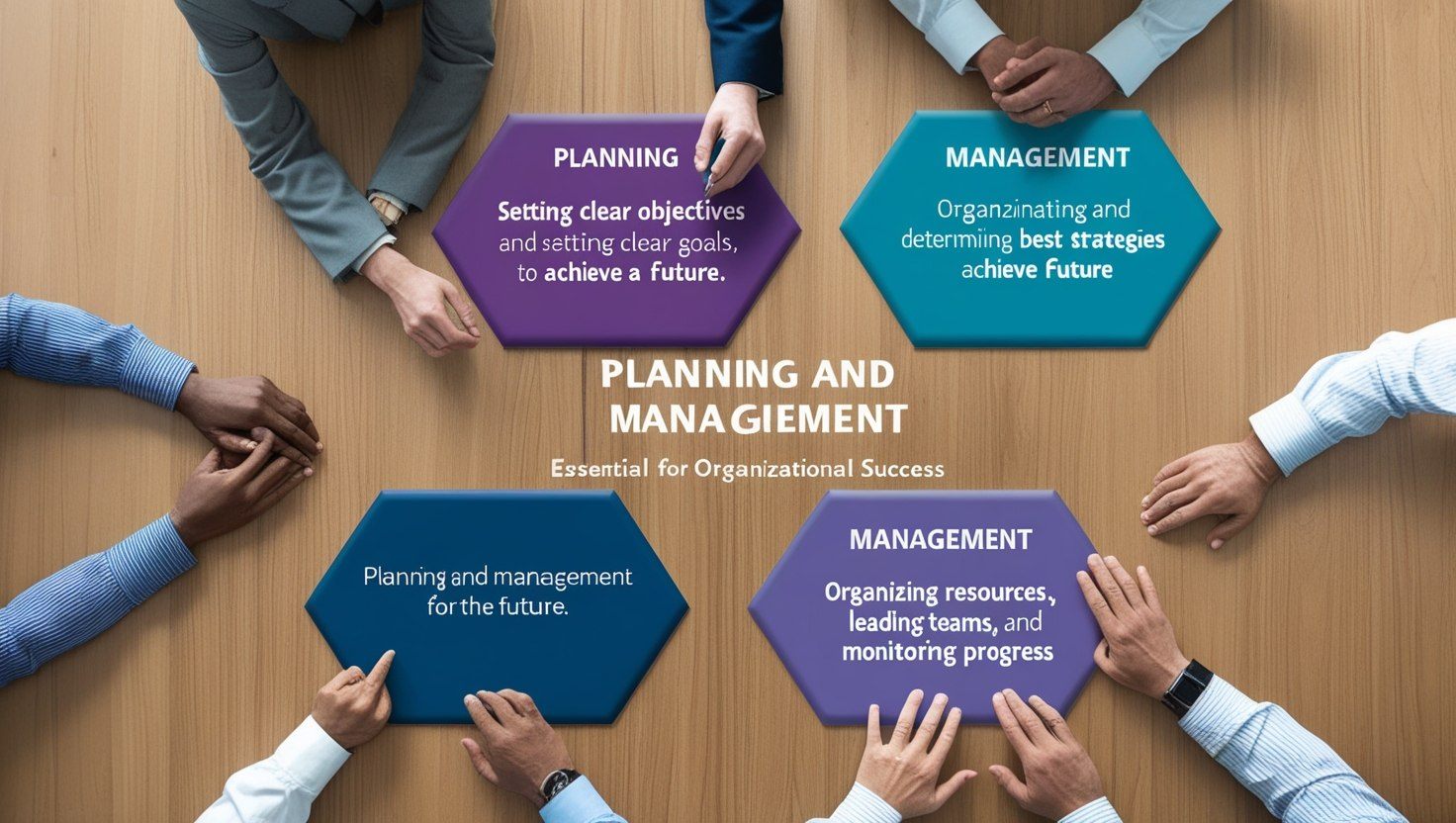Planning and Management , In any organization, be it a school, business, or non-profit, the processes of planning and management are essential for achieving goals and sustaining long-term success. Planning provides a roadmap for the future, outlining the steps necessary to achieve objectives, while management ensures that resources are effectively used to implement those plans. The synergy between these two functions is critical for navigating challenges, capitalizing on opportunities, and driving organizational growth.
This article delves into the concepts of planning and management, examining their significance, key principles, and the interplay between the two in fostering a successful and adaptive organization.
Understanding Planning: The Blueprint for Success
Planning is the process of setting objectives and determining the best course of action to achieve them. It involves identifying goals, analyzing the current situation, forecasting future conditions, and developing strategies to bridge the gap between the present and the desired future. Planning provides direction and clarity, helping organizations anticipate potential challenges and align resources effectively.
Types of Planning
There are several types of planning, each serving a unique function within an organization:
- Strategic Planning: This involves long-term planning that focuses on the overall direction of the organization. Strategic plans typically cover several years and are concerned with broad objectives such as market expansion, innovation, or organizational growth. Strategic planning helps leaders establish a vision and mission for the organization and determine the actions necessary to achieve them.
- Tactical Planning: Tactical planning breaks down strategic goals into more specific, short-term objectives. It focuses on specific departments or areas of the organization and outlines the steps that need to be taken to implement the strategic plan. For example, if a company’s strategic goal is to increase market share, the marketing department might develop a tactical plan to launch a new advertising campaign.
- Operational Planning: This type of planning focuses on day-to-day operations. It involves creating detailed plans for tasks, schedules, and processes that ensure the smooth functioning of the organization. Operational planning is often concerned with the efficient use of resources, ensuring that all employees are working toward common goals.
- Contingency Planning: Contingency plans are developed to prepare for unexpected events or emergencies. They outline how the organization will respond to crises, such as natural disasters, technological failures, or economic downturns. Effective contingency planning allows organizations to remain resilient in the face of uncertainty.
The Importance of Planning
Effective planning is crucial for several reasons:
- Direction and Focus: Planning provides a clear direction for the organization, ensuring that all efforts are aligned with the organization’s goals. It helps employees understand their roles and responsibilities, fostering a sense of purpose and motivation.
- Resource Allocation: Through planning, organizations can allocate resources—such as time, money, and personnel—more effectively. This ensures that resources are used efficiently and are directed toward areas that will yield the greatest return.
- Risk Management: Planning allows organizations to anticipate potential challenges and develop strategies to mitigate risks. By identifying potential obstacles in advance, organizations can respond more proactively and minimize disruptions.
- Adaptability: In a rapidly changing world, organizations must be able to adapt to new circumstances. Planning provides a framework for making adjustments to strategies and objectives as needed, ensuring that the organization remains flexible and responsive to external changes.
The Management Function: Ensuring Plan Execution
Management is the process of coordinating and overseeing the activities and resources of an organization to achieve its objectives. While planning provides the blueprint, management ensures that the plan is executed efficiently and effectively. Management encompasses a range of functions, including leadership, decision-making, resource allocation, and performance monitoring.
Key Functions of Management
- Planning: As mentioned earlier, planning is a key management function. Managers are responsible for setting goals and developing strategies to achieve them. This involves making decisions about the best course of action and ensuring that all team members understand the organization’s objectives.
- Organizing: Once a plan is in place, managers must organize the resources necessary to execute it. This involves structuring the organization in a way that maximizes efficiency and effectiveness. Managers must assign tasks, delegate responsibilities, and ensure that the right people are in the right roles.
- Leading: Leadership is a critical management function that involves motivating and guiding employees toward achieving organizational goals. Effective leaders inspire trust and commitment among their teams, fostering a positive and productive work environment. Leadership also involves communication, ensuring that employees are informed and engaged in the organization’s mission.
- Controlling: The controlling function of management involves monitoring progress and making adjustments as needed to ensure that goals are met. This includes setting performance standards, evaluating outcomes, and taking corrective actions if necessary. Controlling ensures that the organization stays on track and meets its objectives in a timely manner.
- Decision-Making: Managers are often faced with complex decisions that impact the success of the organization. Decision-making involves evaluating options, weighing risks and benefits, and choosing the best course of action. Effective decision-making requires analytical thinking, problem-solving skills, and the ability to consider both short-term and long-term consequences.

Leadership vs. Management
While leadership is often seen as a subset of management, the two concepts are distinct. Management is primarily concerned with organizing and coordinating resources, while leadership focuses on inspiring and motivating people. Both functions are essential for organizational success, but they require different skill sets.
Leaders are visionary and forward-thinking, often focusing on innovation and change. They inspire others to follow their vision and create a sense of purpose within the organization. Managers, on the other hand, are more concerned with maintaining order and ensuring that processes run smoothly. They focus on the practical aspects of executing plans and achieving goals.
In many cases, successful managers must also be effective leaders. They must be able to balance the day-to-day operational responsibilities with the ability to inspire and motivate their teams. This requires a combination of technical skills, emotional intelligence, and strategic thinking.
The Interplay Between Planning and Management
Planning and management are closely intertwined, with each function reinforcing the other. Without effective planning, management efforts can become disorganized and inefficient. Conversely, without strong management, even the best-laid plans may fail due to poor execution.
The planning process sets the stage for management by defining the organization’s goals and outlining the steps needed to achieve them. Once the plan is in place, management takes over to ensure that resources are allocated appropriately, tasks are completed on time, and objectives are met. Throughout the process, managers must continuously monitor progress, make adjustments as necessary, and provide feedback to keep the organization on track.
The relationship between planning and management can be seen in various aspects of organizational life:
- Goal Alignment: Effective planning ensures that all members of the organization are working toward the same goals. Management ensures that these goals are communicated clearly and that employees understand their roles in achieving them.
- Resource Utilization: Planning helps identify the resources needed to achieve organizational objectives. Management ensures that these resources are used efficiently and that there is no waste or duplication of effort.
- Performance Monitoring: Planning sets performance standards, while management monitors progress and takes corrective action if necessary. This ensures that the organization remains focused on its goals and can adjust to any changes in the external environment.
- Adaptability: In today’s fast-paced world, organizations must be able to adapt to new challenges and opportunities. Effective planning provides a framework for making adjustments, while strong management ensures that these changes are implemented smoothly and without disruption.
Challenges in Planning and Management
Despite their importance, planning and management are not without challenges. Some common obstacles include:
- Uncertainty: The future is inherently unpredictable, and planning involves making assumptions about what will happen. Unforeseen events, such as economic downturns, technological changes, or shifts in consumer preferences, can render even the best plans obsolete.
- Resource Constraints: Organizations often face limitations in terms of time, money, or personnel. Effective management requires finding creative solutions to make the most of limited resources while still achieving organizational objectives.
- Resistance to Change: Implementing new plans or management strategies can sometimes encounter resistance from employees who are comfortable with the status quo. Effective leaders must be able to communicate the need for change and motivate their teams to embrace new approaches.
- Complexity: Large organizations often have multiple goals, departments, and stakeholders, making planning and management more complex. Managers must be able to navigate this complexity, ensuring that all parts of the organization are working together toward common objectives.
Conclusion
Planning and management are the twin pillars of organizational success. Planning provides the blueprint for the future, while management ensures that this blueprint is executed efficiently and effectively. Together, these functions help organizations navigate uncertainty, allocate resources wisely, and achieve their goals.
In an increasingly complex and dynamic world, the ability to plan strategically and manage resources effectively is more important than ever. Organizations that invest in strong planning and management practices will be better positioned to adapt to change, seize opportunities, and thrive in the long term.
References:
- Mintzberg, H. (1994). The Rise and Fall of Strategic Planning.
- Drucker, P. (2006). The Practice of Management.
- Robbins, S. P., & Coulter, M. (2020). Management (14th Edition).
- Kotter, J. P. (2012). Leading Change.

20 thoughts on “Planning and Management”
Comments are closed.